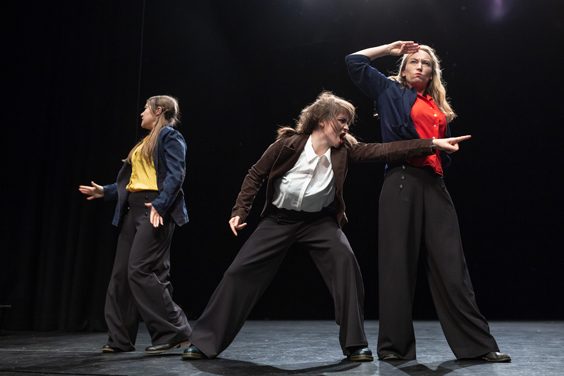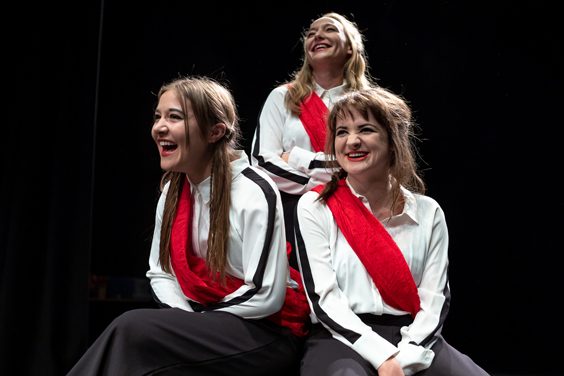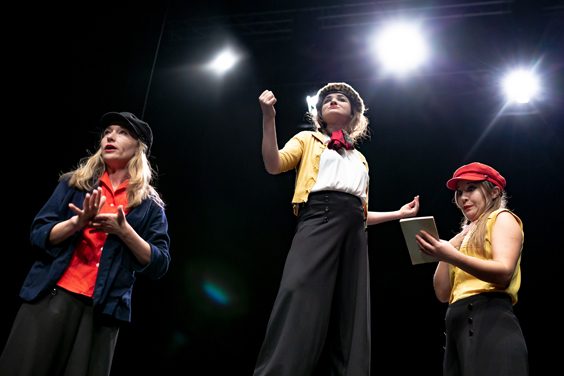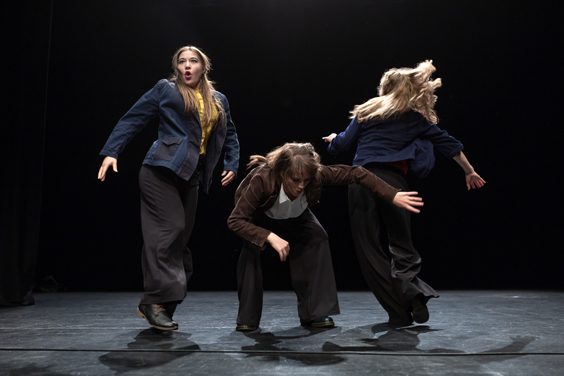Women of Aktion – Review – Stage@Leeds
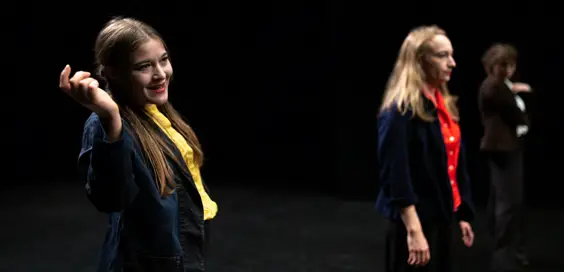
By Eve Luddington, October 2018
I wait ages to see a radical left-wing theatre company, then have two shows in Leeds in one week – both commemorating the end of World War 1 with anti-war plays. Red Ladder I knew, but not the makers of Women of Aktion, Bent Architect. Based in Bradford since 2007 it’s a small-scale touring company with a tight budget and big ambitions. It presents new writing which aims to give voice to the voiceless, those who make mainstream society uncomfortable.
Women of Aktion, written by Mick Martin and directed by him and Jude Wright, is set in a Manchester Repertory Theatre in 1935. I went with interest and some trepidation after reading the publicity material, wondering if I’d need a degree in 20th century European History as well as Theatre, to understand the content. I’m still pondering that.
The play begins with Cockney theatre-maker and director, Joan Littlewood (of Oh What a Lovely War! fame), embarking on a production of Ernst Toller’s Draw the Fires with the man himself. Toller, a Jewish, German Expressionist playwright, was jailed in 1919 for his socialist activities and exiled from his homeland in 1933 by the Nazi regime. Draw the Fires tells the story of the Kiel Uprising in 1918 when tens of thousands of the German military laid down their arms and demonstrated against World War I, prompting others across Germany to do likewise. Arguably, their actions led to the Kaiser’s abdication, the Armistice and the Weimar Republic.
“Fast-moving piece”
Women of Aktion shows Joan Littlewood’s outrage at Toller’s almost complete omission of women’s contribution to the uprisings, and imagines some of these German women rising from the dead to tell Littlewood their stories. It uses women’s graphic verbatim accounts, dramatised in flashbacks, to re-create German civilians’ suffering and starvation in 1917-18; of such hunger and misery that women fought each other in food queues or lost their appetite altogether, of their abuse as they began to rebel. We’re told of their mass whispering campaigns and their part in the demonstrations and revolutionary demands against aristocratic leaders who regarded the military as war-fodder and neglected the ordinary people who were on their knees.
Jude Wright and Mick Martin direct with intense commitment. They use minimal props and costume against a simple backdrop of three revolving painted screens which indicate location. Rightly, their main focus is on the communication of a fast-moving piece in which three actors have to people the stage with many characters. It’s a logistical and artistic challenge which they manage with some flair.
“Deeply affecting voice”
Fortunately the actors, onstage throughout the 75 minutes of Mick Martin’s piece, are versatile, energetic and appealing. They move the screens and play live music while donning a variety of scarves, hats or shawls over their basic blacks to distinguish each of their the many characters. It’s a pleasure to watch them working together with great rapport, sensitivity and physicality. Their rendition of ‘The Time Will Come’, sung acapella with rhythmic foot-stamping, is a gutsy and rousing highlight.
Joan Littlewood is Francesca Anderson’s main role. She has the utter conviction of the passionate activist that Littlewood was. She throws herself into each character with wholehearted attack. ‘The secretary’, who has to record the names of the war-dead in a ledger, is played by Rachel Gill Davies. She has an entirely sympathetic presence (though it was distracting that she was writing in an old, battered typewriter manual rather than an actual ledger). She gives deeply affecting voice to the suffering of women in war, yet she can be feisty too. Claire-Marie Seddon communicates effectively and humorously the arrogant, self-obsessed and antipathetic Ernst Toller Mick Martin depicts: we’re meant to loathe him and we do. But she can switch in a moment to another, more sympathetic character.
“A lot of information”
The play itself is the result of a partnership with Professor Ingrid Sharp and Dr Corrine Painter, who have identified over 100 women involved in the uprisings, and brought to light some of their testaments, the first time these voices have been heard on stage. It’s about time her story is told when we remember the past!
But, although the actors characterise each role well, so many German women are portrayed so swiftly in the play that I lost their voices while I was trying to keep up. That was one of my difficulties with a script which seems more a dramatic presentation of research than a satisfactory drama in itself. And sometimes, the action is interrupted for the actors to announce that one or another researched event may not have actually happened. I’m all for clarification of facts in this era of fake news, but presenting information to query its veracity seems overly self-conscious and halts the flow, highlights ambiguous incidentals and takes focus away from those all-important newly-voiced women’s narratives.
For me, the play tries to do too much in 75 minutes. It gives a lot of information but doesn’t tell satisfactorily either the story of Littlewood and Toller or that of the German women. Though I appreciate that Littlewood was, in her own way, a working-class revolutionary and feminist, like the German women, I do wonder whether the Littlewood and Toller spat was the most suitable context in which to place the voices of German women revolutionaries.
“Needs illuminating”
Even if it is, the depiction of Ernst Toller as a symbol of masculine arrogance and ignorance made me squirm. I have no idea of the man’s character but to laugh at a caricatured version of him is to diminish his life and works in order to shine a light on women. That seems crude, unfunny and unfair. Toller was a pioneer of a highly influential theatre genre. We hear in the play that he committed suicide in 1939 and is hardly known now, but we aren’t told that he killed himself at the age of 45, poverty-stricken after donating all his money to the Spanish Civil War Republican cause, and shortly after hearing that his brother and sister had been sent to concentration camp. It may be, too, that while he’s hardly known in the UK, Joan Littlewood is hardly known in Germany.
So, I left the theatre admiring the aims of this company and many elements of the performance. But, although I admire Bent Architect’s collaboration with researchers to shine light on an aspect of his/her story that needs illuminating, this particular play didn’t quite work for me.
images: Karol Wyszynski
